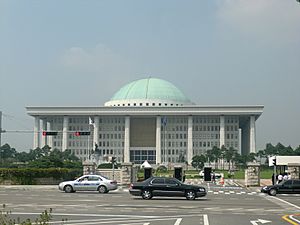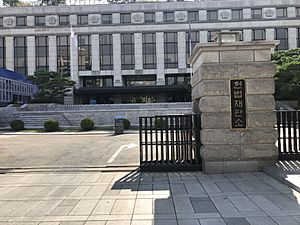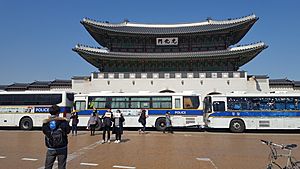Impeachment of Park Geun-hye facts for kids
Quick facts for kids Impeachment of Park Geun-hye |
|
|---|---|
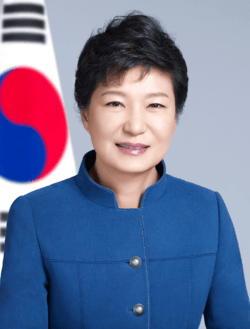 |
|
| Accused | Park Geun-hye (President of South Korea) |
| Proponents | Woo Sang-ho, Park Jie-won, Roh Hoe-chan |
| Date | 9 December 2016 – 10 March 2017 |
| Outcome |
|
| Charges | Abuse of power, coercion |
| Cause | 2016 South Korean political scandal |
| Impeachment vote by National Assembly (9 December 2016) |
|
| Votes in favor |
234 / 300
|
| Votes against |
56 / 300
|
| Present | 2 |
| Not voting | 1 (7 votes invalid) |
| Result | Park impeached and suspended from the presidency for the duration of the impeachment trial; Hwang Kyo-ahn becomes acting president |
| Decision by Constitutional Court of Korea (10 March 2017) |
|
| Votes in favor |
8 / 8
|
| Votes against |
0 / 8
|
| Result |
|
| National Assembly: 2004092 Constitutional Court: 2016헌나1 |
|
The impeachment of Park Geun-hye was a big event in South Korea. Park Geun-hye was the President of South Korea. Impeachment means a government official is accused of doing something wrong and might be removed from office.
This impeachment happened because of a political scandal. It involved her close friend, Choi Soon-sil, who was accused of interfering with the President's work.
On December 9, 2016, the National Assembly (South Korea's parliament) voted to impeach President Park. Out of 300 members, 234 voted for impeachment. This was more than the two-thirds needed. After the vote, Park's powers as president were temporarily stopped.
Hwang Kyo-ahn, who was the Prime Minister, became the acting president. The final decision then went to the Constitutional Court of Korea. On March 10, 2017, the court agreed with the impeachment. All eight judges voted to remove Park from office.
Because of this, a new presidential election was held early, on May 9, 2017. Moon Jae-in was elected as the new president. Park Geun-hye was later removed from office for abusing her power.
Contents
How Impeachment Works in South Korea
Rules for Impeaching a President
The rules for impeachment are in the Constitution of South Korea. This is the country's main law book. According to Article 65, if the President or other high-ranking officials break the Constitution or other laws while doing their job, the National Assembly can start an impeachment process.
For the President, a special rule applies. More than half of the National Assembly members must suggest the impeachment. Then, at least two-thirds of all members must vote to approve it. This means 200 out of 300 members must agree.
If an impeachment vote passes, the President's powers are immediately stopped. They cannot act as president while the case is being reviewed. However, being impeached does not stop them from facing other legal actions for their actions.
The Constitutional Court's Role
The Constitutional Court of Korea makes the final decision on impeachment. This court has 180 days to decide after receiving an impeachment case. If the person leaves office before the court makes a decision, the case is usually closed.
Before Park Geun-hye, another president, Roh Moo-hyun, was impeached in 2004. He was suspended for two months. But the Constitutional Court later decided he should stay in power.
Steps to Impeachment
Starting the Impeachment Process
On December 3, 2016, some members of the National Assembly officially proposed the impeachment of President Park Geun-hye. These were Woo Sang-ho, Park Jie-won, and Roh Hoe-chan. They said she had broken the Constitution and other laws.
President Park's own party, the Saenuri Party, was divided. Some wanted her to step down on her own. Others, especially with many public protests happening, agreed that she should be impeached.
The Vote in the National Assembly
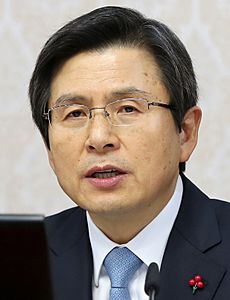
The National Assembly planned to vote on the impeachment bill on December 9. To impeach the President, at least 200 out of 300 members needed to vote yes. There were 172 members from opposition parties and independent lawmakers. This meant at least 28 members from Park's own Saenuri Party had to vote with the opposition.
On December 9, the vote happened. The National Assembly approved the impeachment motion. The vote was 234 in favor and 56 against. Two members did not vote, and seven votes were invalid.
| National Assembly Vote to impeach the President (Park Geun-hye) |
|
|---|---|
| Two-thirds majority (200/300) needed | |
| Choice | Votes |
|
234 / 300
|
|
|
56 / 300
|
|
| Abstention |
2 / 300
|
| Invalid votes |
7 / 300
|
| Did not vote |
1 / 300
|
After the vote, President Park's powers were suspended. Prime Minister Hwang Kyo-ahn became the acting president. The case then moved to the Constitutional Court.
Public Reaction
Many people gathered outside the National Assembly during the vote. People who had been protesting against Park were happy with the news. Some of Park's supporters, however, felt it was unfair.
On January 1, 2017, Park Geun-hye spoke publicly for the first time since the impeachment. She denied any wrongdoing.
Constitutional Court's Decision
The Court Hearings
The Constitutional Court had up to 180 days to make its decision. The court held public hearings. They listened to arguments from both sides to decide if the impeachment was fair and followed the rules.
The court started its main hearings on January 3, 2017. President Park was not required to attend these hearings. The hearings continued until February 27.
A special investigation found evidence that Park and her friend Choi had worked together. They were accused of asking companies for money and unfairly treating artists. This suggested that Park might have abused her power.
The Final Verdict
On March 10, 2017, the Constitutional Court announced its decision. All eight judges voted unanimously to uphold the impeachment. This means they agreed with the National Assembly's decision.
This decision officially removed Park Geun-hye from her position as president. It was the first time a sitting president in South Korea was removed from office since the country became a democracy in 1987. Outside the court, there were clashes between Park's supporters and police.
What Happened Next
After being removed from office, Park Geun-hye lost many of her benefits as a former president. These included her retirement pension and free medical services. However, she kept her security protection.
Park left the Blue House (the presidential office) on March 11. She was later removed from office for abusing her power.
With Park removed, Prime Minister Hwang Kyo-ahn continued as acting president. A new presidential election had to be held within 60 days. On May 9, 2017, Moon Jae-in was elected as the 12th president of South Korea.
See also
 In Spanish: Proceso de destitución de Park Geun-hye para niños
In Spanish: Proceso de destitución de Park Geun-hye para niños
 | Emma Amos |
 | Edward Mitchell Bannister |
 | Larry D. Alexander |
 | Ernie Barnes |


